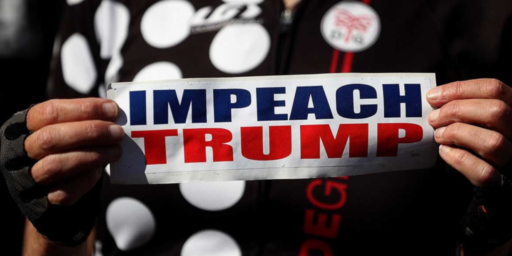PoliSci Types: GOP to Take Senate in November
Via TPM: Political Scientists: November Is Still A Slam-Dunk For The GOP
A new symposium of the 2014 midterm elections in PS: Political Science and Politics forecasts that GOP could gain a median of 5 or 6 Senate seats and about 14 in the House. Unlike other popular models, this doesn’t just measure polling or how unpopular President Barack Obama is. Rather, there are a host of other indicators suggesting that the outlook does slightly favor Republicans in the House and the Senate.
Click the link in the quoted paragraph above for the actual articles. The articles are ungated and on only a couple of pages long each (PS is written for a general professional audience and its articles tend to be pretty accessible).






Doesn’t mean much to me without a review of their track records in the prediction/prognostication game.
Remember…a whole lot of people thought Romney was going to win.
I’ll stick with Sam Wang, thanks.
@C. Clavin:
I don’t recall anyone worth taking seriously who predicted a Romney win (I do recall a lot of highly partisan hacks predicting such, however).
(And Wang may yet be correct, but I would counsel against hanging on to an analyst when s/he is an an outlier who happens to comport with one’s preferred predictions).
@Steven L. Taylor:
Um……..
http://www.gallup.com/poll/158519/romney-obama-gallup-final-election-survey.aspx
Anyway…it’s not like I have money on it…but the record is the record…he’s been the most accurate for some time….hard to argue with that (although Nate Silver seems scared enough to want argue with it)…the gold standard is the gold standard for a reason.
Let’s be honest. The Republicans are definitely favored to retake the Senate, based on the fundamentals (the map, prior history, etc.) The Democrats have to just hope against hope , that say, our candidates are better campaigners than the Republican candidates.The Democrats can hold on. But realistically, it’s a uphill struggle.That’s what the prognosticators are saying.
That said, Republican victory isn’t inevitable-just likely. Upsets can happen.
The good thing about the Democrats is that they have unearthed some good candidates this cycle. I think Grimes has been a great candidate in Kentucky. She most likely will not beat McConnell this cycle: but she might take Paul NEXT cycle. We’re building a farm team….
Well, the Tea Party is doing its best to ensure that the Democrats retain the senate. That may have some effect on the outcome.
@C. Clavin: That you can produce one poll is not the same as acting like a lot of people with credibility were arguing that Romney to win (and IIRC, there were criticisms of Gallup’s sampling technique at the time).
Given that I spent a lot of time arguing with/writing about the fringe types who were certain about the “skewed” nature of the polling, I have a pretty good recollection of the ’12 cycle (check out the archives if you like).
I am not saying that Wang is fringe. I am saying that a) he isn’t a political scientist, and b) there are some legitimate criticisms of his model.
Having said that, I am not arguing that he is wrong, but that he is an outlier amongst serious analysts on this subject (and since I know you would prefer a Dem Senate, I would recommend that you perhaps take a step back in you certitude).
And in regards your initial comment about track records: while I cannot produce a scorecard, I can say that the polisci lit on fundamentals and election prognostication is actually pretty solid and that you are declaring Wang to be the gold standard on a very small N.
@Steven L. Taylor:
A model which keeps proving the criticisms wrong.
We shall see.
As to my preferences…I don’t see what real difference a 1 or 2 seat Republican majority will make.
They will immediately do away with the filibuster…but still won’t have a veto-proof majority. To pass anything they will have to make compromises with the President…something he has been trying to do for 6 years. It worked pretty well during the Clinton era…if we get back to that I’d be happier with Washington than I am today. (Although I still want Turtle Face to lose.)
@C. Clavin: Well, as I have oft-noted: no party controls the Senate unless they have 60 votes (which is almost as rare as unicorns).
@Steven L. Taylor:
The biggest danger a Republican Senate poses is Dynamic Scoring forced on the CBO. And that’s easily reversed.
I don’t remember the polls favoring Romney-I mostly remember the partisan mouth pieces saying why the polls were wrong.
State elections are a little harder to poll, and it appears that many of the races are close. I’ve been unconvinced that the GOP will retake the senate but pretty convinced they would pick up seats. I still think the GOP may not take the senate-especially since the GOP seems to be pretty good at botching elections they should be able to win (Kansas, North Carolina are two examples).
Democrats are going to keep the Senate and retake the House due to the 90+% popularity “National Conversation of Guns’ that President Obama is leading with the full support of all Democrats.
@Paul L.:
That joke fell flat the first two times you copy and pasted it. I applaud you for your tenacity in the face of indifference towards your idiocy.
@C. Clavin:
Estimating that Sharron Angle had a 99.997% chance of winning in 2010 is not what I’d call “proving the criticisms wrong.”
There’s no “We shall see” here. Nothing that happens is going to prove anyone right or wrong, because the estimates are too tentative. If Dems keep the Senate, that won’t prove Wang’s 54% estimate of the chances of Dem control correct, nor will it prove Silver’s 58% of the the chances of GOP control wrong. I explained this to you the other day, but you still don’t get it: very slight probabilistic estimates of the chances of future events can’t be proven or disproven by whether the events happen, because they aren’t saying the opposite outcome is unlikely.
Wang responds to the TPM article.
@Kylopod:
Oh…so when Wang says his model has out-performed Silver…he’s wrong.
OK then.
I guess Wang doesn’t get it either.
http://politicalwire.com/archives/2014/10/06/sam_wang_factchecks_nate_silver.html
@C. Clavin:
This time with the link…
http://election.princeton.edu/2014/10/07/political-science-model-matches-pec-long-term-forecast/
@C. Clavin:
That would’ve been a great reply if it by any means addressed Kylopod’s point.
@Neil Hudelson:
Look…if PEC says there is a N% chance of Dems holding the Senate and 538 say there is a N% chance of Republicans gaining the Senate..and Democrats hold…then one is right and one is wrong…semantics be damned.
Nate Silver hasn’t spent weeks doing his darnedest to impune Wang because…
I’m sure you are right…technically…but so am I…in the real world.
@C. Clavin: Yes, but at that point semantics isn’t the issue, mathematics is. If I told you that the probability that my prediction was X but the outcome ended up being Y then that doesn’t actually mean my model was wrong. (50% chance of rain and all that).
Look: I am not arguing that Wang is wrong. I am arguing that you are getting overly infatuated with his model because it says what you hope will be the case (or so it seems). It is prudent to be skeptical when one model is different than other reputable ones.
@C. Clavin: BTW: based on the stance you are taking, would it mean that Wang should be discredited and banned from making predictions in the future? You know, real world and all.
(I am being a bit snarky, but if you are going to make technical v. “real world” classifications then you have to recognize the implications).
@C. Clavin:
This is where you’re completely off base.
How can I best explain this? Let’s say you flip a coin twice, and I tell you beforehand that there’s a 25% chance that it’ll land on heads both times. If you end up getting heads twice, does that prove me wrong? Of course not. My statement was, in fact, a fundamental mathematical truth. Events with 25% likelihood sometimes happen. (Specifically, they happen 1/4th of the time.) So when I tell you that there’s a 25% chance of something happening, that doesn’t mean I’m predicting that it won’t happen.
In other words, your statement that if Dems hold the Senate, it’ll prove that one model “is right and one is wrong” shows a complete failure to understand the concept of probability.
Ironically, Wang himself makes that very point in the post you link to:
In short, there’s a decent chance that Dems will hold the Senate; there’s a decent chance that they’ll lose it. Both Wang and Silver take this assumption for granted; their only disagreement is which outcome is slightly more likely.
And because it’s so close, the outcome can’t tell us who was right and who was wrong. When Wang estimated that Sharron Angle had a 99.997% chance of winning in 2010, and she ended up losing by more than 5 points, that suggested flaws in his model. But if either Wang or Silver or any other election analyst says there’s a greater-than-50%, but less-than-60% chance of some electoral event occurring, and that electoral event doesn’t occur, we really can’t conclude that they were “wrong.” It’s just too close to tossup to make definitive statements. Events with 45% likelihood happen all the time, and the fact that they happen doesn’t prove that their likelihood was higher. This isn’t about “semantics,” but about a basic understanding of what probability means.
I do think that there is a developing meme that political scientists are saying that Republican takeover of the Senate is INEVITABLE, and that the Democrats need to just stop trying and face reality. Now this isn’t quite what the political scientists are saying, but headlines like NOVEMBER IS STILL A SLAM DUNK FOR THE GOP certainly indicate inevitability.
At this point I think the race is still on and that Democrats keeping the Senate is certainly a possibility and a substantial one at that. No need to run up the white flag.
@Stonetools: That’s an excellent point. In fact, I thought of mentioning the misleading headline before, but I got distracted by my argument with C. Clavin. Still, it illustrates the same fallacy which Sam Wang talked about in the passage I quoted: thinking that any probability estimate over 50% is tantamount to 100%.
@Stonetools:
The headline was my gripe too. In the article they say a median pick up of 5-6 seats in the Senate with slightly better than 50% chance to take the Senate. On what innumerate planet does that equate to a ‘slam-dunk’ for the GOP?
@Kylopod: @Grewgills: A valid point, indeed. Even my own headline is too definitive. Of course, my goal was a quick post to point towards the PS articles more than anything else.
@Kylopod:
First…you assume I am rounding up. I am not. I understand what 63% (today) means.
Second…you aren’t getting it…if the coin comes up heads I get to choose whether I get the ball or or defer to the second half. The actual outcome matters. We don’t live in a lab experiment. Certainly Nate Silver is worried enough about it that he is spending a lot of time arguing about it.
Simple question: If 538 is saying Republicans have a 56% chance and PEC is saying Democrats have a 63% chance…and Democrats win…who is getting the bragging rights? Don’t say no one because that’s ivory tower BS.
Again…technically speaking you are absolutely right.
Quantum physics tells us that indeed an object can be in two places at once. I believe that without question. But in the world which we live an object can’t be in two places at once. That is true too. Both are right. Really only one matters.
@C. Clavin:
You keep saying “technically speaking.” I don’t know how much clearer it can be–these are forecasts of probability, not predictions of what will occur. If Republicans win, Wang’s model could still be absolutely correct–just in this case the 37% prevailed.
If a weather forecaster says “There is a 60% chance of rain today.” And all we get is cloudy skies, some thunder, and no raiin, that doesn’t make the weatherman’s forecast wrong. At all. He’s giving probabilities. That’s what Silver and Wang is doing.
You want everyone to admit that there is a right or wrong based on the results of the elections, which means that you fundamentally do not understand what it is Wang and Silver are doing. You cannot say “You guys may be technically right, but for the sake of my argument can you lie and say I’m right?” And then be surprised by the results.
@Neil Hudelson:
54% probability for Republicans and 63% probability for Democrats is not the same thing.
One says Republicans have a slightly better than 50-50 shot at winning…little more than a coin flip.
One says Democrats have a slightly better than 50-50 shot at winning…little more than a coin flip.
An extremely close horse-race. As you say…neither will be “wrong”. But one will definitely be more right.
To your weatherman analogy…the way you judge forecasters is by their record over time. If they keep calling for 60% rain and you keep missing out on sunny days…then you begin to doubt the forecaster. But as you say…he was never wrong.
That is why I asked for the Poly-Sci guys history in my very first comment. And why in my second comment I said that Wang’s been more accurate for some time.
More simple questions:
If they are both the exact same thing why in the world would anyone bother with the exercise? And if they are both the exact same thing why are Silver and Wang arguing over which is better?
Is it because their record at being more accurate matters?
@C. Clavin:
When two people or two models both call something a virtual toss up, that single event doesn’t meaningfully distinguish between the accuracy of the models. Do you really not understand that, or are you just digging in?
@Grewgills:
Me and Nate Silver…who says it’s Sam Wang against the world.
@Grewgills:
@C. Clavin:
You’ve changed your argument. Let me once again quote what you said earlier:
You said “one is right and one is wrong,” not “one is more right than the other.”
Correct. And you’ve provided no evidence that Sam Wang has a consistently better record over time than Nate Silver. Your entire basis for this claim rests on the 2012 Senate races. But let’s look more closely at that example. Silver called every Senate race “right” (i.e. gave higher than 50% to the eventual winner) except for two–Montana and North Dakota. Wang called all the Senate races that year “right.” So he gets a couple more brownie points than Silver for this particular election year in one chamber of Congress. Happy?
Except that Wang called two Senate races “wrong” in 2010, in Nevada and Colorado. Silver also called those races “wrong,” but he didn’t have the distinction of projecting that Sharron Angle had a 99.997% of winning, when she went on to lose by more than 5 points. That’s a pretty massive blunder (to go back to my coin flip analogy, you’d have a better chance of getting heads ten times in a row by pure luck than Angle had of losing the race according to Wang’s model), and Silver has never made a mistake that huge to this date. He did forecast an Angle win, but only with 75% certainty (basically, the chances of not getting heads twice in a row, still a fairly common event).
When it comes to House races, Wang’s record is even worse compared with Silver’s. They both underestimated Republican gains in 2010, but Wang underestimated it by three more seats.
The bottom line: Wang and Silver are both very smart guys who have developed good, though hardly flawless, election forecasting models, and none of the differences between their methodologies justify the way you’ve been holding Wang’s current forecasts like a security blanket against anyone with a less optimistic estimate of the chances of Democratic Senate control.
@Kylopod:
From Sam Wang…who I assume has kept track:
@Kylopod:
And that is simply a gross mis-characterization.
@C. Clavin: The problem with Wang’s boast is that it’s based on a very narrow range. In 2008 and 2010, his estimates of which Senate races were over 50% were exactly the same as Silver’s. His claim that his model “consistently matched or outperformed” Silver’s rests entirely on two Senate races in 2012, which Wang called correctly and Silver didn’t. Furthermore, his definition of “matching” makes the same conceptual error that he warned against earlier: counting any estimate over 50% as the same. When Silver said Sharron Angle had a 75% chance of winning, and Wang had it at 99.997%, his model didn’t “match or outperform” Silver–it clearly did a lot worse.
To truly get a sense of whose model has proven more accurate, you’d have to measure how far the margin of their estimates were from the final outcome. Simply counting who had slightly more over-50 estimates turning out to win is a crude and simplistic way of evaluating them, and Wang should realize that.